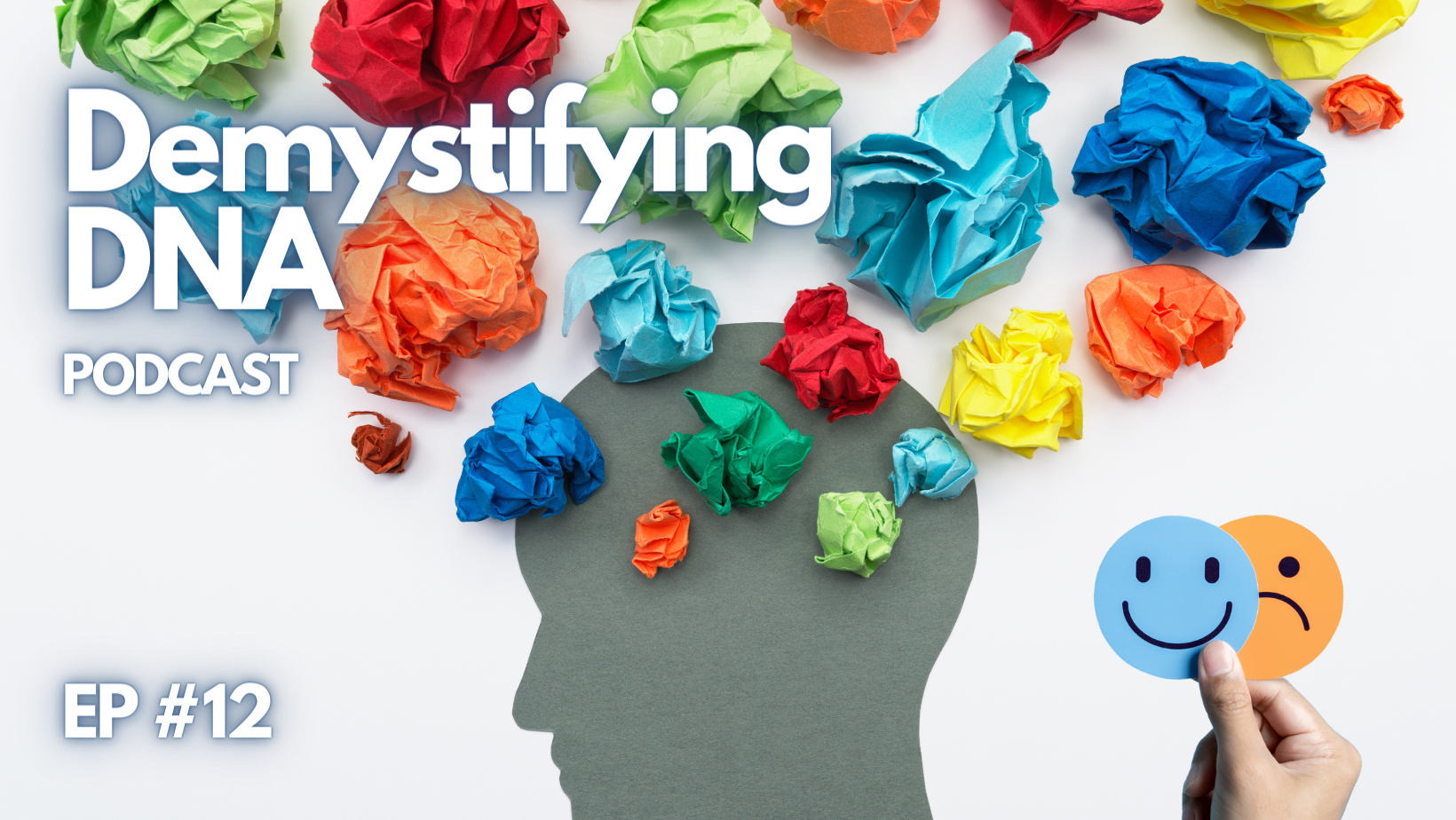
Decoding Minds: The Intricate Genetics of Mental Health
Introduction:
In the enlightening episode “Decoding Minds: Unraveling the Genetics of Mental Health” of the “Demystifying DNA” podcast, hosts Dr. Tiffany Montgomery and co-host Tak Williams explore the fascinating intersection of genetics and mental health. This episode provides an in-depth look at how our genetic makeup influences our mental well-being, shaping our experiences and responses to various psychological stresses.
The Historical Context of Genetics in Mental Health:
Dr. Montgomery sets the stage by tracing the evolution of genetic research, from its early beginnings to the latest advancements in gene editing technologies like CRISPR-Cas9. The historical overview provides listeners with a foundational understanding of how genetic studies have become instrumental in identifying mental health disorders.

Personalized Medicine and Mental Health:
A significant portion of the conversation is dedicated to personalized medicine. The hosts discuss how individual genetic profiles are revolutionizing healthcare, particularly in diagnosing and treating mental health conditions. By tailoring treatments to genetic predispositions, personalized medicine offers a more effective approach to mental healthcare.
The Broader Impact of Genetic Research:
The episode extends beyond mental health, touching upon the broader implications of genetic research in fields like agriculture and conservation. Dr. Montgomery and Tak highlight how understanding genetics is crucial in various sectors, affecting our day-to-day life and the environment.

Ethical Considerations and Genetic Research:
Ethical aspects of genetic advancements, especially in mental health, form a core part of the discussion. The hosts delve into the moral responsibilities that come with the power to alter genes, reflecting on the need for conscientious stewardship in the field of genetics.
The Role of Genetics in Mental Resilience:
Dr. Montgomery explains the concept of mental resilience from a genetic perspective. The discussion centers around how certain genetic markers can influence an individual’s ability to cope with mental stressors, pointing to the potential for developing targeted therapies to enhance mental resilience.

Defining Mental Health and Disorders:
Tak Williams steers the conversation towards defining mental health and distinguishing it from mental disorders. This part of the episode demystifies common misconceptions, emphasizing that while everyone experiences mental health, not everyone suffers from mental disorders.
Empowerment Through Genetic Knowledge:
As the episode concludes, the emphasis is on empowering individuals with knowledge about their genetic makeup. The hosts encourage listeners to seek resources for genetic testing and to use this information for informed decision-making about their mental health.
Conclusion:
“Decoding Minds: Unraveling the Genetics of Mental Health” is more than just a podcast episode; it’s an educational journey into the complex world of genetics and mental health. Dr. Montgomery and Tak invite listeners to stay curious and informed, underscoring the importance of genetics in understanding and managing mental well-being. They remind us that with the rapid advancements in genetic research, staying informed is key to navigating the challenges and opportunities that lie ahead in mental healthcare.

Q: What is the main focus of the podcast episode “Decoding Minds”?
- A: The episode focuses on understanding how genetics shape our mental well-being, discussing genetic predispositions, heritability, and the polygenic nature of mental health disorders.
Q: How does Dr. Tiffany Montgomery define mental health?
- A: Mental health refers to a person’s emotional, psychological, and social well-being, encompassing their ability to handle stress, relate to others, and make decisions.
Q: What role do genetics play in mental health?
- A: Genetics contribute to an individual’s susceptibility to certain mental health conditions, with genetic predispositions involving variations in genes related to brain function and stress response.
Q: Can environmental factors influence mental health?
- A: Yes, environmental factors such as stress, trauma, and family dynamics play a crucial role in the onset and course of mental health conditions, alongside genetic factors.
Q: What are genetic markers, and how are they significant in mental resilience?
- A: Genetic markers are specific DNA sequences that help scientists understand why some people are better at handling challenges, contributing to an individual’s capacity for resilience.
Q: What recent breakthroughs in mental health research were discussed?
- A: Recent breakthroughs include the use of ketamine for treating depression and anxiety, pharmacogenetic testing for personalized antidepressant treatment, and artificial intelligence in diagnosing and monitoring mental health conditions.
Q: What is the difference between mental health and mental health disorders?
- A: Mental health refers to overall well-being, while mental health disorders are diagnosable conditions that affect mental functioning and cause distress or impairment.
Q: How do genetic factors and resilience relate to mental health?
- A: Genetic factors can increase vulnerability to mental health disorders, while resilience-related genes can mitigate the impact of stressors, demonstrating the complex interplay between genetics and mental health.
Q: What is epigenetics, and how does it relate to mental health?
- A: Epigenetics involves how environmental factors modify gene activity without altering the DNA sequence, impacting mental health outcomes by influencing gene expression.
Q: How does the podcast suggest individuals can address mental health issues?
- A: The podcast recommends speaking up and reaching out for help, utilizing resources like online telehealth or organizations for support, and understanding that experiencing mental health issues is normal.










